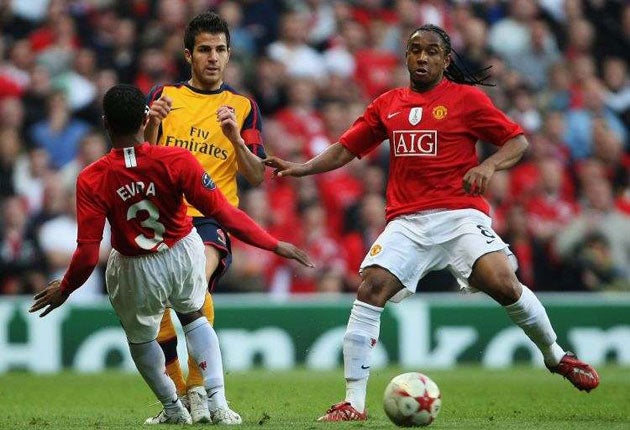Mark Fleming: Fabregas bails out sinking ship
Arsenal's captain had to abandon his attacking role to stop visitors' midfield from being overwhelmed

Your support helps us to tell the story
From reproductive rights to climate change to Big Tech, The Independent is on the ground when the story is developing. Whether it's investigating the financials of Elon Musk's pro-Trump PAC or producing our latest documentary, 'The A Word', which shines a light on the American women fighting for reproductive rights, we know how important it is to parse out the facts from the messaging.
At such a critical moment in US history, we need reporters on the ground. Your donation allows us to keep sending journalists to speak to both sides of the story.
The Independent is trusted by Americans across the entire political spectrum. And unlike many other quality news outlets, we choose not to lock Americans out of our reporting and analysis with paywalls. We believe quality journalism should be available to everyone, paid for by those who can afford it.
Your support makes all the difference.Arsenal's best hope of an away goal came from the boots of Cesc Fabregas. But instead of steering his side from the bridge, the captain was forced to go below decks and had to bail like crazy to stop his side's Champions League hopes from sinking like a stone.
As Manchester United threatened to swamp Arsène Wenger's team in their semi-final first leg at Old Trafford last night, Fabregas had to stifle his attacking instincts and go back and help their struggling midfield. The central pairing of Samir Nasri and Alex Song were given a terrible run-around in the opening 20 minutes, and Fabregas had no choice but to drop back and roll up his sleeves.
But with the Spaniard doing the dirty work, there was little chance for him to weave his magic. Since his return from a knee injury he has been playing far closer to the opposition goal, much in the way Steven Gerrard supports Fernando Torres at Liverpool. His two goals in Sunday's 2-0 victory over Middlesbrough were evidence of his growing threat as a goalscorer.
Whenever Fabregas went back into a deeper role, Arsenal immediately gained far greater composure – but their ability to cause problems of their own decreased by the same degree. The Londoners never really looked capable of scoring the goal to turn the tie on its head.
His presence helped keep the scoreline down, as did several fine saves from goalkeeper Manuel Almunia. But the further Fabregas moved towards his own goal, the more isolated the striker Emmanuel Adebayor became, and the less potent his team looked. His importance to this young Arsenal side cannot be overstated. The better Fabregas plays, the better Arsenal play.
On the face of it, the visitors' four-man midfield should have enjoyed a numerical advantage over United's three. But the phenomenal work rate of Wayne Rooney and Carlos Tevez meant they were chasing shadows.
Arsenal's lack of a natural ball- winner in the centre of the pitch was exposed by the bewildering array of United's movement. In the past Patrick Vieira would have stepped up to the task, using his immense physical presence and power to halt United's momentum.
Nasri and Song were simply over-run. Nasri, in particular, is a terrific passer when given the ball. But he is not the man who is going to put in vital tackles to win possession. The European champions were able to pass their way around the pitch with disarming ease, leaving Arsenal desperately scratching their heads for answers.
In a break in play Nasri threw his arms wide in desperate exhortation of his team-mates. There was a real danger Arsenal might have folded had Fabregas not slipped back to help the cause.
Wenger's side showed only brief glimpses of the beautiful football that has revitalised their flagging season in recent weeks. Theo Walcott turned Patrice Evra and passed to Adebayor, who laid the ball into the path of Fabregas, but his shot was too close to the United keeper Edwin van der Sar, who saved with ease.
Arsenal's disjointed performance was summed up in a moment in the first half, when Fabregas briefly found himself some space but, in his haste to dispatch a shot from 25 yards, sliced the ball so horribly that it bobbled away for a throw-in. The derision of the Manchester United fans only worsened his embarrassment.
With Fabregas reduced to playing in midfield, Arsenal managed to limit the damage. But they were unable to snatch the away goal that would have made so much difference to next Tuesday's second leg at the Emirates.
The failure to win the Champions League is the glaring gap in both the history of Arsenal and the career of Wenger. The holes in the side's midfield should be a far more pressing concern to both.
Join our commenting forum
Join thought-provoking conversations, follow other Independent readers and see their replies
Comments